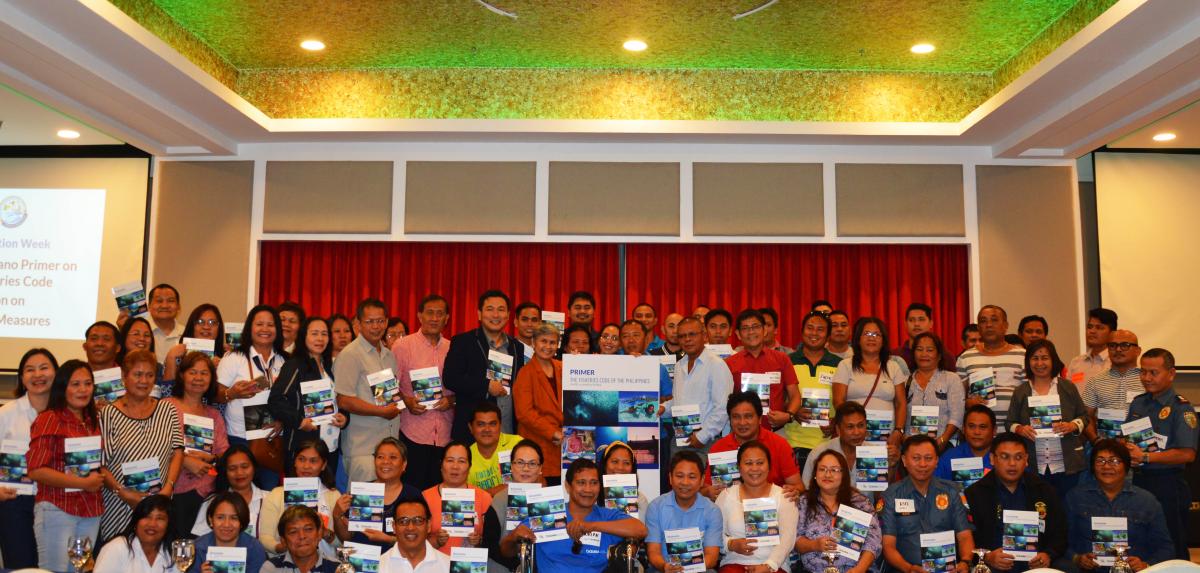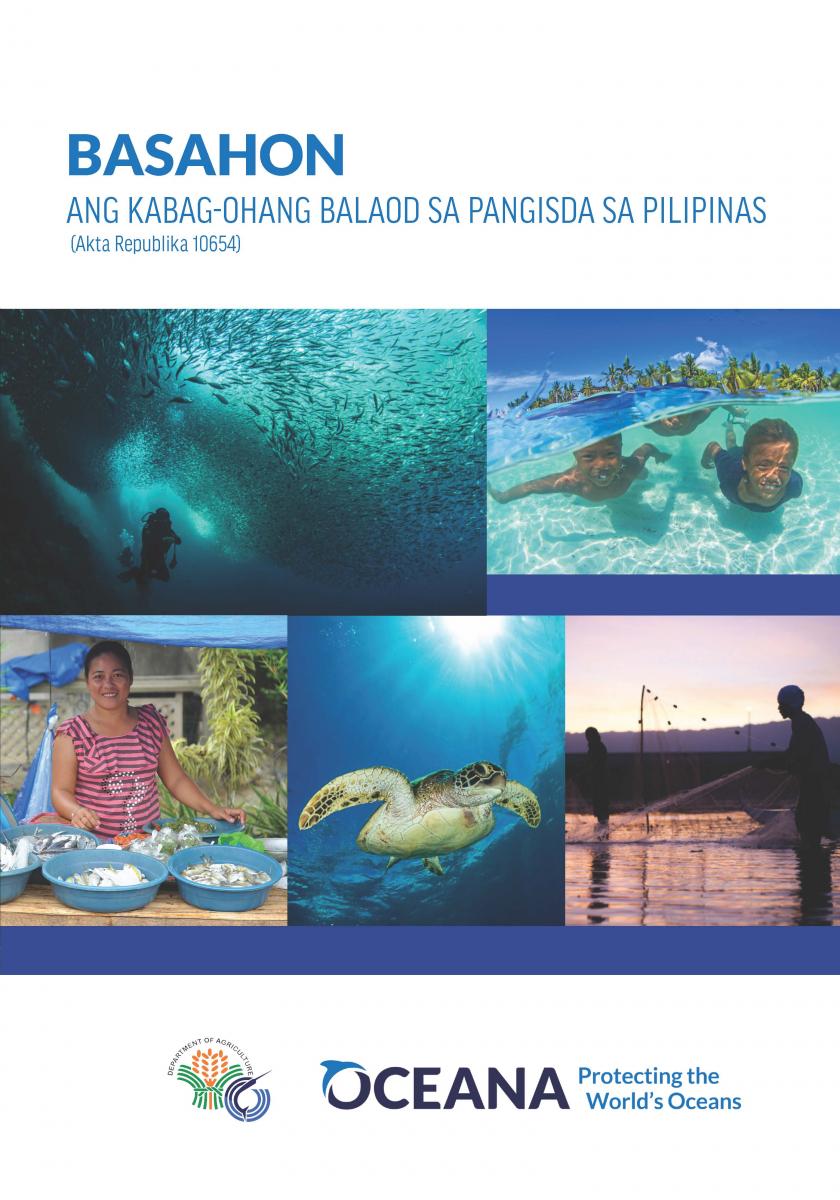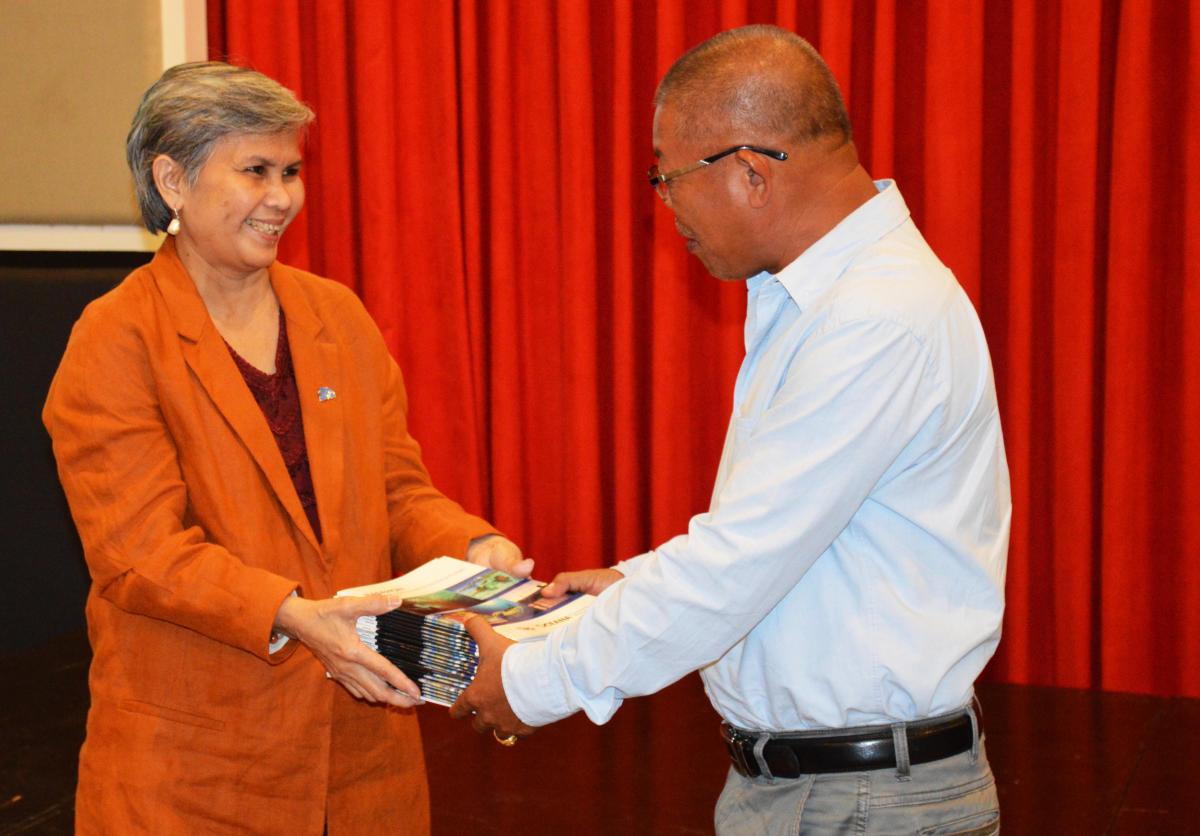Seafood Security Highlighted in 54th Fish Conservation Week
Press Release Date: October 20, 2017
“The government, through the Department of Agriculture’s Bureau of Fisheries and Aquatic Resources (DA-BFAR) is working towards more sustainable management for the country’s fisheries and aquatic resources. We are relentless in carrying out initiatives geared towards more science-based management for our marine and inland resources. One of these programs, Malinis at Masaganang Karagatan or Clean and Abundant Seas, reflects the earnestness of the government to promote resource protection and conservation,” says BFAR National Director Eduardo Gongona.
Fish Conservation Week is a yearly event organized by BFAR to intensify awareness on the need to conserve and protect fisheries and aquatic resources while fighting illegal, unreported and unregulated fishing.
“This is an important celebration to highlight the importance of fisheries for food security, while emphasizing to our people that we have to conserve our marine resources now,” says BFAR Central Visayas Regional Director Dr. Allan Poquita.
As part of the celebration, Poquita says they also organized a discussion with commercial and municipal fishers, local government units, non-government organizations, plus the Coastal Law Enforcement Alliance for Region-7 (CLEAR-7) to discuss prevalent issues in fisheries conservation, particularly on law enforcement.
“It is very important for our stakeholders to be aware of the law, especially about the amended Fisheries Code. They should know and understand the violations and the consequences,” adds Poquita.
The event also includes a discussion on Vessel Monitoring Measures (VMM), which highlights the use of new technology to monitor fishing activities and ensure safety at sea for fishers. Poquita says VMM is important to monitor fishing activities, particularly for commercial fishers in municipal waters and protected areas such as the Tañon Strait.
The Tañon Strait, one of the largest marine protected areas in the Philippines, pioneered the requirement and pilot-testing of vessel monitoring technology in protected seascapes, under the pilot-testing program of Oceana in partnership with government.
BFAR also launched the Cebuano primer on the Fisheries Code as amended by RA 10654 in collaboration with Oceana. The primer highlights the salient points of the amended Fisheries Code, including provisions on vessel monitoring, Citizen’s Suits and Strategic Lawsuits Against Public Participation (SLAPP).
During the event, a special map highlighting the hotspot areas in the Cebu side of the Tañon Strait where illegal commercial and destructive fishing plus other violations of the law occur, was unveiled. It was the product of various workshops of the Tañon Strait’s Small Management Units Cebu Cluster.
“Let us honor and ensure compliance with our fisheries and environmental laws while mainstreaming science-based decision-making and engaging citizens for the protection of our seas. These are the key ingredients for restoring the health of fishing grounds like the Tañon Strait, as we strengthen partnerships among stakeholders to ensure seafood security for all, forever,” says Oceana Philippines Vice-president Atty. Gloria-Estenzo Ramos.
The Cebuano version of the amended Fisheries Code Primer can be downloaded here.
The English version can be downloaded here.

Stakeholders from all over the Visayas pose with BFAR and Oceana’s Cebuano Fisheries Code Primer at an event in Cebu City. (Maan Mayo / Oceana)

The Cebuano Primer on the Amended Fisheries Code presents the law in a non-technical manner. It includes provisions on fishing jurisdictions, prohibited acts, administrative adjudication Citizen’s Suits and SLAPP. (Oceana)

Oceana Philippines head Atty. Gloria Estenzo-Ramos turns over copies of the Cebuano Fisheries Code Primer to Bureau of Fisheries Region-7 Director Dr. Allan Poquita. (Maan Mayo / Oceana)
Location: Manila, Philippines
Contact: Gregg Yan (GYan@oceana.org) / Candeze Mongaya (Cmongaya@oceana.org)
“The government, through the Department of Agriculture’s Bureau of Fisheries and Aquatic Resources (DA-BFAR) is working towards more sustainable management for the country’s fisheries and aquatic resources. We are relentless in carrying out initiatives geared towards more science-based management for our marine and inland resources. One of these programs, Malinis at Masaganang Karagatan or Clean and Abundant Seas, reflects the earnestness of the government to promote resource protection and conservation,” says BFAR National Director Eduardo Gongona.
Fish Conservation Week is a yearly event organized by BFAR to intensify awareness on the need to conserve and protect fisheries and aquatic resources while fighting illegal, unreported and unregulated fishing.
“This is an important celebration to highlight the importance of fisheries for food security, while emphasizing to our people that we have to conserve our marine resources now,” says BFAR Central Visayas Regional Director Dr. Allan Poquita.
As part of the celebration, Poquita says they also organized a discussion with commercial and municipal fishers, local government units, non-government organizations, plus the Coastal Law Enforcement Alliance for Region-7 (CLEAR-7) to discuss prevalent issues in fisheries conservation, particularly on law enforcement.
“It is very important for our stakeholders to be aware of the law, especially about the amended Fisheries Code. They should know and understand the violations and the consequences,” adds Poquita.
The event also includes a discussion on Vessel Monitoring Measures (VMM), which highlights the use of new technology to monitor fishing activities and ensure safety at sea for fishers. Poquita says VMM is important to monitor fishing activities, particularly for commercial fishers in municipal waters and protected areas such as the Tañon Strait.
The Tañon Strait, one of the largest marine protected areas in the Philippines, pioneered the requirement and pilot-testing of vessel monitoring technology in protected seascapes, under the pilot-testing program of Oceana in partnership with government.
BFAR also launched the Cebuano primer on the Fisheries Code as amended by RA 10654 in collaboration with Oceana. The primer highlights the salient points of the amended Fisheries Code, including provisions on vessel monitoring, Citizen’s Suits and Strategic Lawsuits Against Public Participation (SLAPP).
During the event, a special map highlighting the hotspot areas in the Cebu side of the Tañon Strait where illegal commercial and destructive fishing plus other violations of the law occur, was unveiled. It was the product of various workshops of the Tañon Strait’s Small Management Units Cebu Cluster.
“Let us honor and ensure compliance with our fisheries and environmental laws while mainstreaming science-based decision-making and engaging citizens for the protection of our seas. These are the key ingredients for restoring the health of fishing grounds like the Tañon Strait, as we strengthen partnerships among stakeholders to ensure seafood security for all, forever,” says Oceana Philippines Vice-president Atty. Gloria-Estenzo Ramos.
The Cebuano version of the amended Fisheries Code Primer can be downloaded here.
The English version can be downloaded here.

Stakeholders from all over the Visayas pose with BFAR and Oceana’s Cebuano Fisheries Code Primer at an event in Cebu City. (Maan Mayo / Oceana)

The Cebuano Primer on the Amended Fisheries Code presents the law in a non-technical manner. It includes provisions on fishing jurisdictions, prohibited acts, administrative adjudication Citizen’s Suits and SLAPP. (Oceana)

Oceana Philippines head Atty. Gloria Estenzo-Ramos turns over copies of the Cebuano Fisheries Code Primer to Bureau of Fisheries Region-7 Director Dr. Allan Poquita. (Maan Mayo / Oceana)
Location: Manila, Philippines
Contact: Gregg Yan (GYan@oceana.org) / Candeze Mongaya (Cmongaya@oceana.org)
